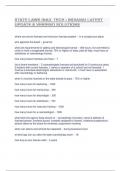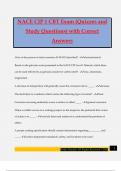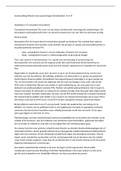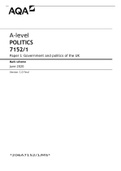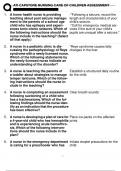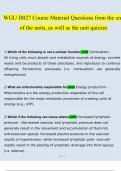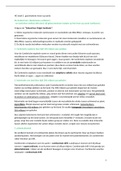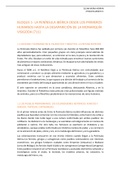Assess the view that Augustine’s view of human nature is too pessimistic. (40 marks)
Augustine’s views surrounding the nature of humanity have been highly influential
throughout Christianity since their creation in the 4th century. Providing explanations for
human wrong doing across history, Augustine has remained a prominent and relevant figure,
seemingly helping to absolve guilt with his possibly morbid perception of human nature.
Although having globally known teachings, even today, he remains a highly controversial
figure with many seeing his view of humans as painfully unpleasant and cynical, especially in
contrast to the views of philosophers such as Pelagius, who took a significantly more
positive stance. However, when seen in the context of the atrocities committed by humans,
such as genocides and mass murder, Augustine can appear more realistic in his
considerations of humanity.
Augustine holds an immensely optimistic view of prelapsarian humanity, teaching
continuously of the harmonious relationship held between God, Adam and Eve, with both
being formed “imago dei”, as taught in Genesis. He particularly highlights the complete
obedience of Adam and Eve to God. Possibly, this provides reason to Augustine’s beliefs
that humanity should always be subservient to leaders, requiring dominant dictators to rule
our society. Furthermore, Augustine teaches of the perfect balance of cupiditas (self-love)
and caritas (generous love), conveying that prelapsarian humanity was one of fairness and
justice, where people were not consumed by self-obsession, sharing the love they had with
God and each other. Additionally, he speaks of humans before the fall as being in a state of
paradise, whereby friendship took priority over lustful acts. Augustine teaches that Adam and
Eve’s sexual relationship was always secondary to their close friendship, insinuating the vital
importance of friendship to be fulfilled in life, even though the fall caused friendships to
become significantly more complex and strained.
Directly contradicting many of his prelapsarian views, Augustine’s stance surrounding
humans after the fall is undeniably pessimistic. Opposing the obedient, harmony of life
before the fall, disobedience to God’s word is key to the nature of humanity after the fall, with
humans using their free will, granted by God to turn their back on him, opting to focus on
cupiditas and selfishness. Additionally, due to Augustine’s belief that the will of humanity was
completely free when they chose to disobey God, it is suggested that our wills are corrupted
by concupiscence, and a desire to do evil. Augustin teaches this as the concept of “original
sin”, an evil that taints all descendants of Adam and Eve, leaving us with ungodly hopes and
desires. This original sin is past on through generations through conception as Augustine
believes the fall created an inability to have sex without being dominated by lust.
After the fall, Augustine is undeniably more pessimistic regarding the nature of humanity as
he argues that our will is in a paradoxical state where we can identify what is morally good,
but we are weakened by desires. This view is explained in St Paul’s letter to the Romans
that states, “For I do not know what I was, but I do everything that I hate”. Augustine referred
to this as akrasia (or weakness of the will). Although he perpetuates a consistently negative
view of humans, Augustine does indicate a possibility for humanity to be saved by God, as
he teaches the dived will can be restored through God-given grace. This conveys the
teaching that those chosen by God, can overcome sin, allowing them to live a holy life. This
grace was expressed through the death of Christ on the cross- if Jesus had not sacrificed
himself, humanity would not have received the possibility of salvation. Although this may
appear to be a fairly optimistic outlook, the question of what happens to those who are not
predestined is still to be answered, weakening Augustine’s argument.
Augustine’s views surrounding the nature of humanity have been highly influential
throughout Christianity since their creation in the 4th century. Providing explanations for
human wrong doing across history, Augustine has remained a prominent and relevant figure,
seemingly helping to absolve guilt with his possibly morbid perception of human nature.
Although having globally known teachings, even today, he remains a highly controversial
figure with many seeing his view of humans as painfully unpleasant and cynical, especially in
contrast to the views of philosophers such as Pelagius, who took a significantly more
positive stance. However, when seen in the context of the atrocities committed by humans,
such as genocides and mass murder, Augustine can appear more realistic in his
considerations of humanity.
Augustine holds an immensely optimistic view of prelapsarian humanity, teaching
continuously of the harmonious relationship held between God, Adam and Eve, with both
being formed “imago dei”, as taught in Genesis. He particularly highlights the complete
obedience of Adam and Eve to God. Possibly, this provides reason to Augustine’s beliefs
that humanity should always be subservient to leaders, requiring dominant dictators to rule
our society. Furthermore, Augustine teaches of the perfect balance of cupiditas (self-love)
and caritas (generous love), conveying that prelapsarian humanity was one of fairness and
justice, where people were not consumed by self-obsession, sharing the love they had with
God and each other. Additionally, he speaks of humans before the fall as being in a state of
paradise, whereby friendship took priority over lustful acts. Augustine teaches that Adam and
Eve’s sexual relationship was always secondary to their close friendship, insinuating the vital
importance of friendship to be fulfilled in life, even though the fall caused friendships to
become significantly more complex and strained.
Directly contradicting many of his prelapsarian views, Augustine’s stance surrounding
humans after the fall is undeniably pessimistic. Opposing the obedient, harmony of life
before the fall, disobedience to God’s word is key to the nature of humanity after the fall, with
humans using their free will, granted by God to turn their back on him, opting to focus on
cupiditas and selfishness. Additionally, due to Augustine’s belief that the will of humanity was
completely free when they chose to disobey God, it is suggested that our wills are corrupted
by concupiscence, and a desire to do evil. Augustin teaches this as the concept of “original
sin”, an evil that taints all descendants of Adam and Eve, leaving us with ungodly hopes and
desires. This original sin is past on through generations through conception as Augustine
believes the fall created an inability to have sex without being dominated by lust.
After the fall, Augustine is undeniably more pessimistic regarding the nature of humanity as
he argues that our will is in a paradoxical state where we can identify what is morally good,
but we are weakened by desires. This view is explained in St Paul’s letter to the Romans
that states, “For I do not know what I was, but I do everything that I hate”. Augustine referred
to this as akrasia (or weakness of the will). Although he perpetuates a consistently negative
view of humans, Augustine does indicate a possibility for humanity to be saved by God, as
he teaches the dived will can be restored through God-given grace. This conveys the
teaching that those chosen by God, can overcome sin, allowing them to live a holy life. This
grace was expressed through the death of Christ on the cross- if Jesus had not sacrificed
himself, humanity would not have received the possibility of salvation. Although this may
appear to be a fairly optimistic outlook, the question of what happens to those who are not
predestined is still to be answered, weakening Augustine’s argument.

